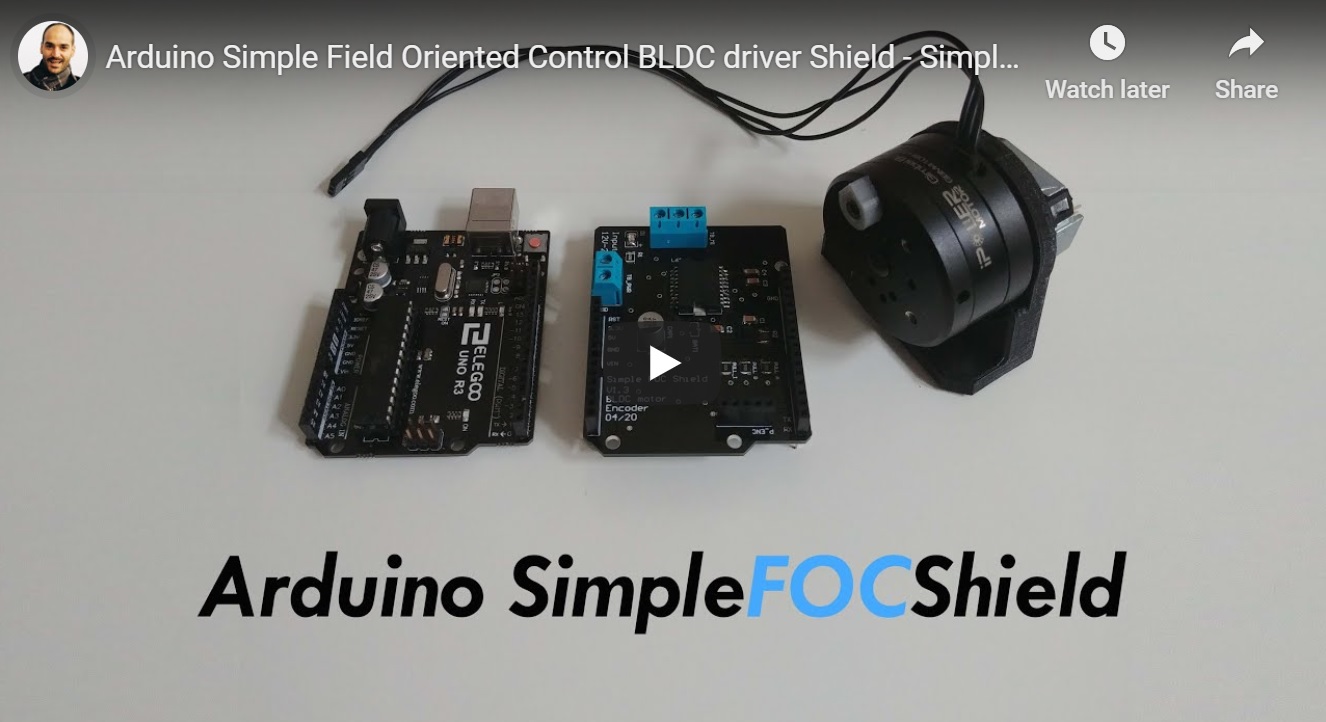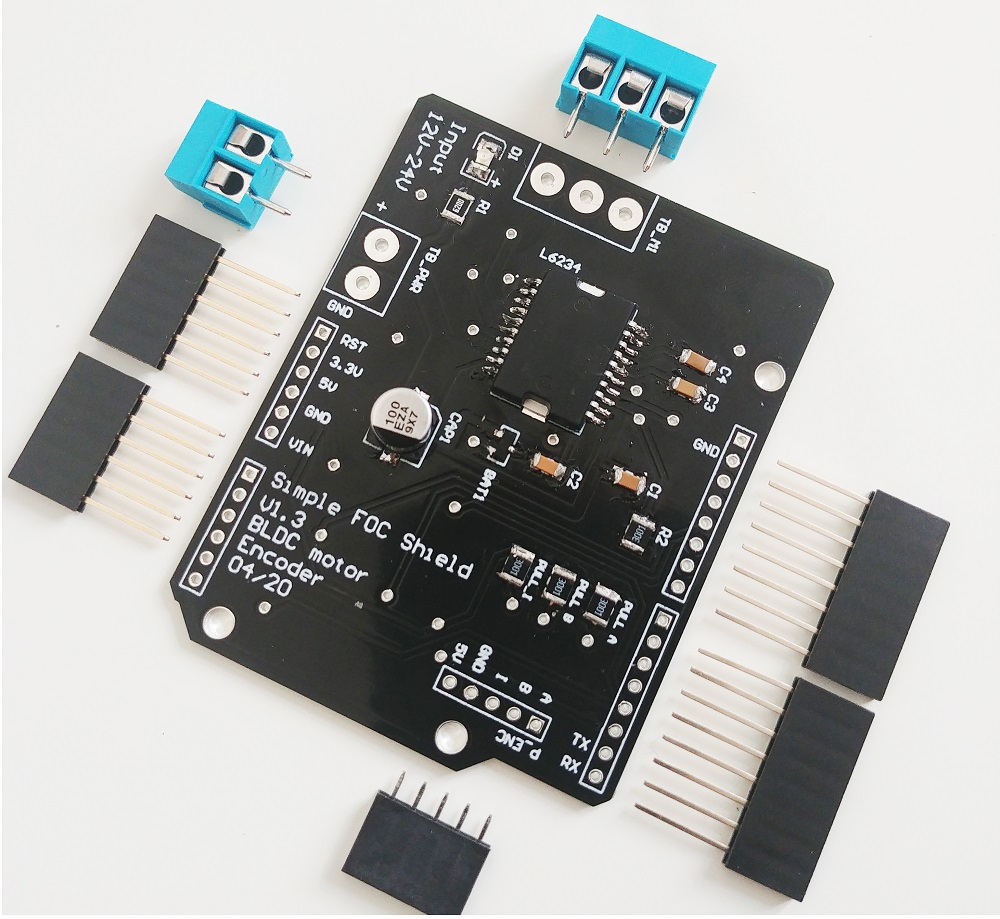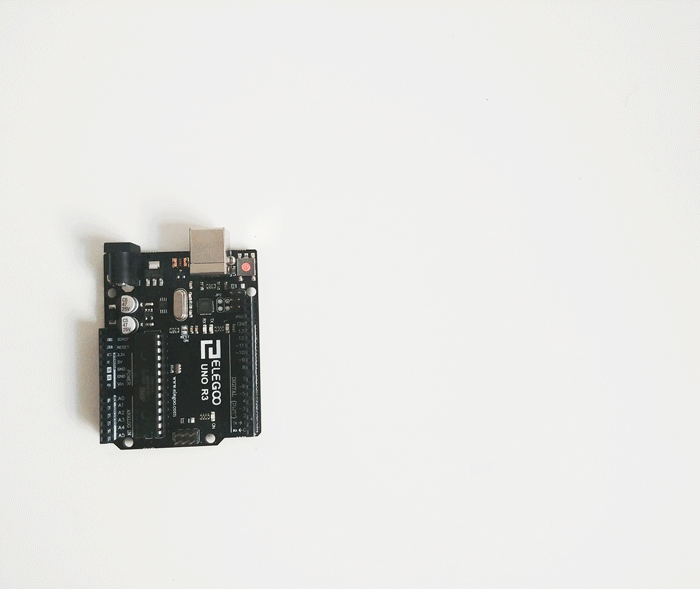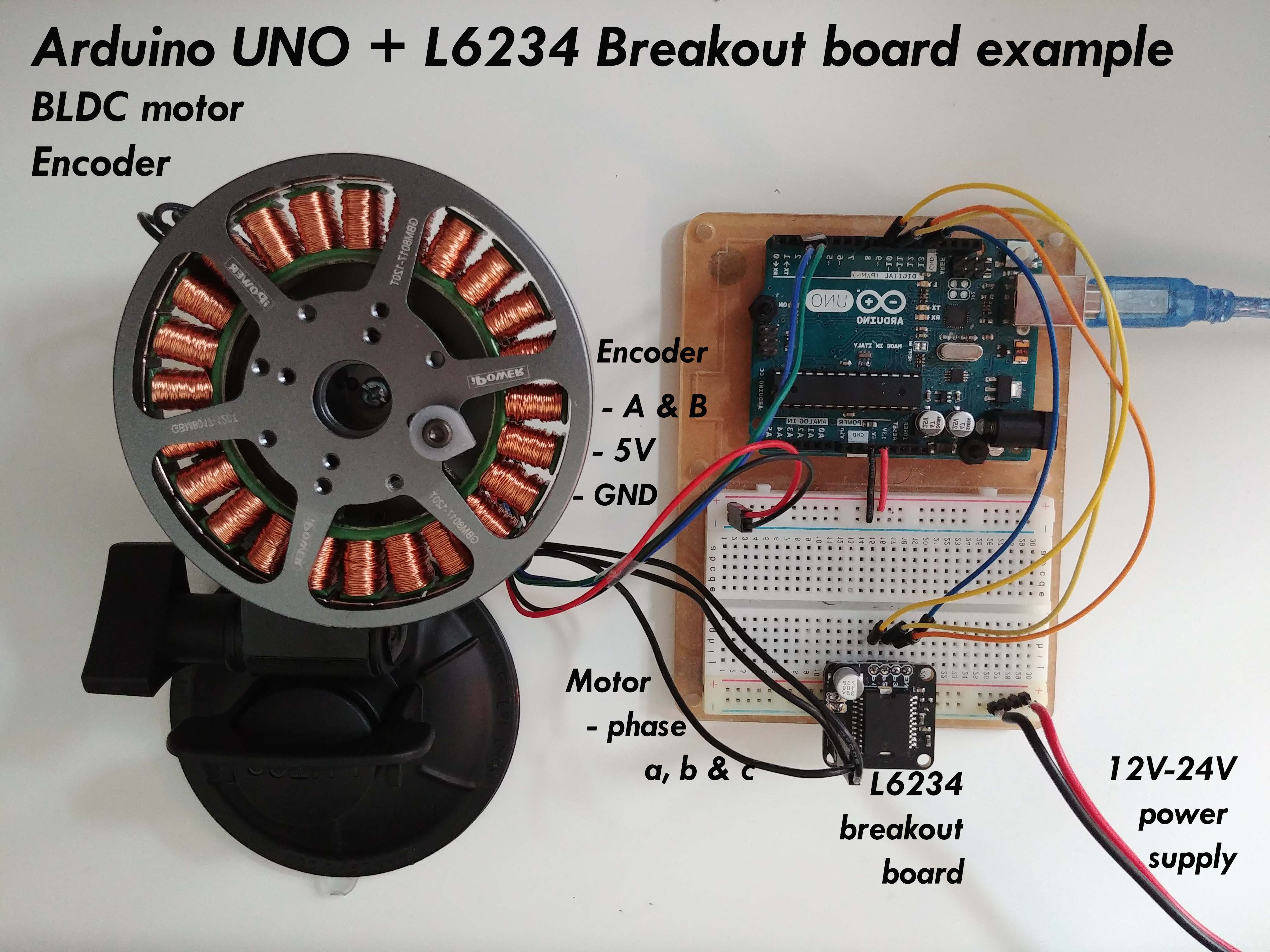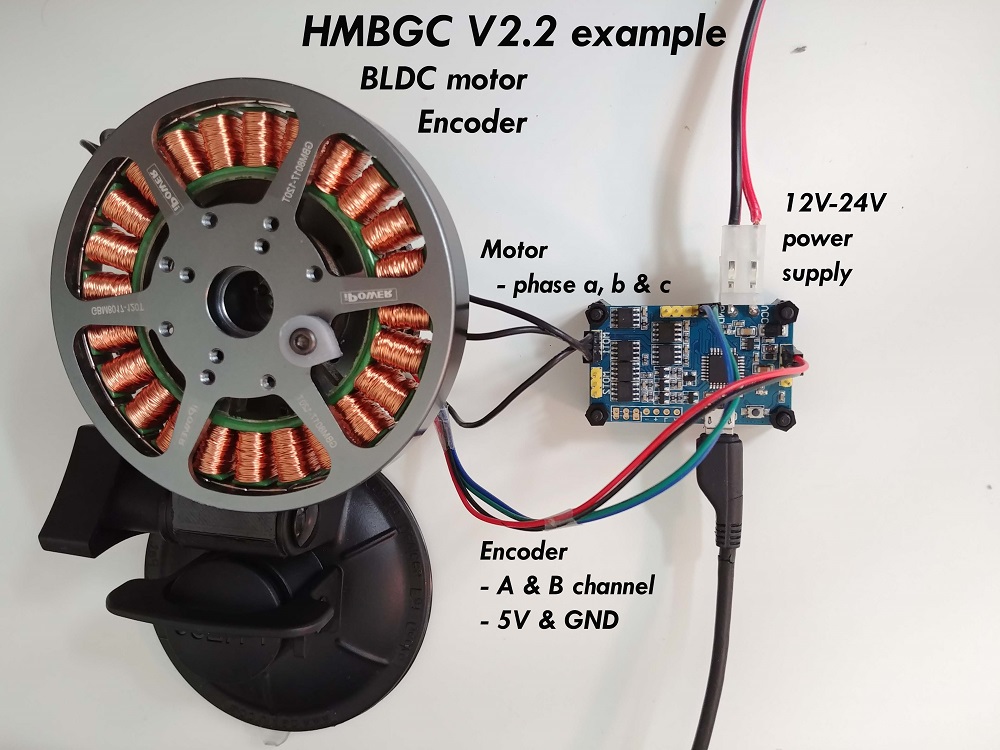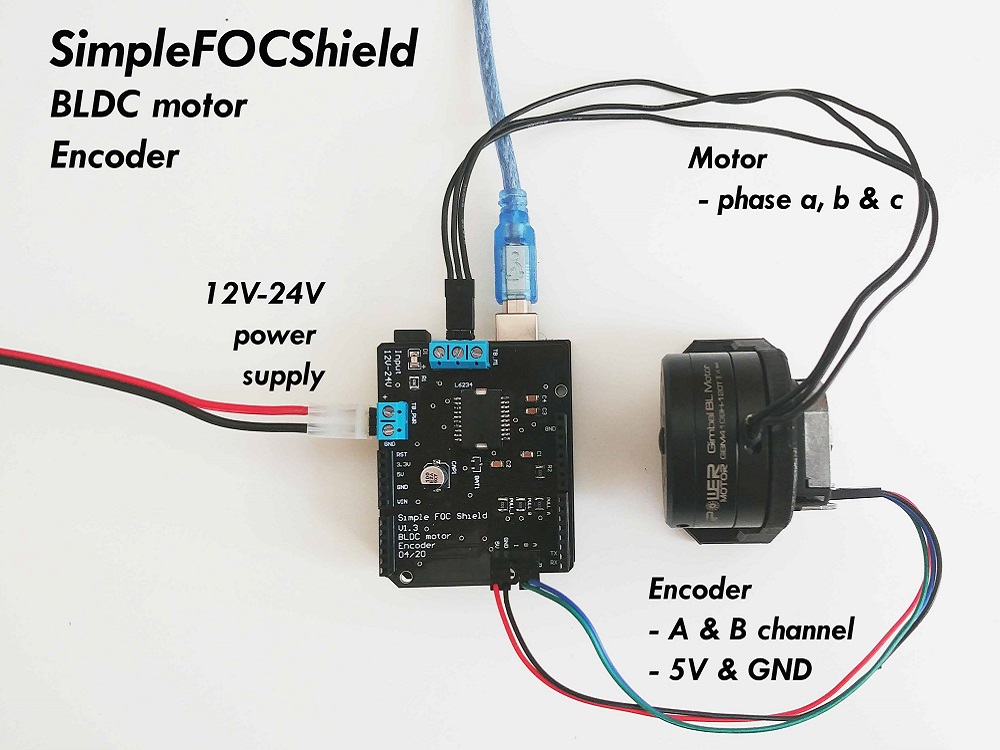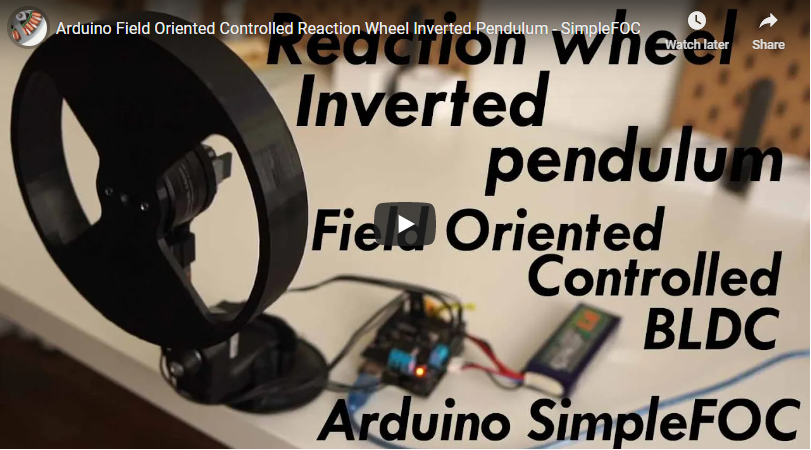Arduino Simple Field Oriented Control (FOC) library
Proper low-cost and low-power FOC supporting boards are very hard to find these days and even may not exist. Even harder to find is a stable and simple FOC algorithm code capable of running on Arduino devices. Therefore this is an attempt to:
- Demystify FOC algorithm and make a robust but simple Arduino library: Arduino SimpleFOClibrary
- Develop a modular BLDC driver board: Arduino SimpleFOCShield.
NEWS 📢
New version of the Arduino SimpleFOClibrary is out! (version 1.5.0 )
New features:Big thanks to @owennewo for awesome suggestions and pull-requests!
- Open-loop motor control
- Support Hall sensors
- Support for Analog interface Magnetic sensor
- New alignment procedure
- automatic sensor direction detection
- possibility to avoid alignment completely- PI controller updated to PID controller
- ...
Arduino SimpleFOCShield
Features
- Plug & play: In combination with Arduino SimpleFOClibrary
- Low-cost: Price of €15 - Check the pricing
- Max power 120W - max current 5A, power-supply 12-24V
- Designed for Gimbal motors with the internal resistance >10 Ωs.
- Stackable: running 2 motors in the same time
- Encoder interface: Integrated 3.3kΩ pullups (configurable)
- Configurable pinout: Hardware configuration - soldering connections
- Arduino headers: Arduino UNO, Arduino MEGA, STM32 Nucleo boards...
- Open Source: Fully available fabrication files - how to make it yourself
If you are interested in this board, order your version on this link: Arduino Simple FOC Shield
Arduino SimpleFOClibrary
This video demonstrates the Simple FOC library basic usage, electronic connections and shows its capabilities.
Features
- Arduino compatible: Arduino library code
- Easy to setup and configure:
- Easy hardware configuration
- Easy tuning the control loops
- Modular:
- Supports as many sensors , BLDC motors and driver boards as possible
- Supports multiple MCU architectures:
- Plug & play: Arduino SimpleFOCShield
Getting Started
Depending on if you want to use this library as the plug and play Arduino library or you want to get insight in the algorithm and make changes there are two ways to install this code.
Arduino SimpleFOC library installation to Arduino IDE
Arduino Library Manager
The simplest way to get hold of the library is directly by using Arduino IDE and its integrated Library Manager.
- Open Arduino IDE and start Arduino Library Manager by clicking:
Tools > Manage Libraries.... - Search for
Simple FOClibrary and install the latest version. - Reopen Arduino IDE and you should have the library examples in
File > Examples > Simple FOC.
Using Github website
- Go to the github repository
- Click first on
Clone or Download > Download ZIP. - Unzip it and place it in
Arduino Librariesfolder. Windows:Documents > Arduino > libraries. - Reopen Arduino IDE and you should have the library examples in
File > Examples > Simple FOC.
Using terminal
- Open terminal and run
cd *arduino libraries folder*
git clone https://github.com/askuric/Arduino-FOC.git- Reopen Arduino IDE and you should have the library examples in
File > Examples > Simple FOC.
SimpleFOC library minimal sketch example
For those willing to experiment and to modify the code I suggest using the minimal version of the code.
This code is completely independent and you can run it as any other Arduino Sketch without the need for any libraries.
Github website download
- Go to minimal branch
- Download the code by clicking on the
Clone or Download > Download ZIP. - Unzip it and open the sketch in Arduino IDE.
Using terminal
- Open the terminal:
cd *to you desired directory* git clone -b minimal https://github.com/askuric/Arduino-FOC.git
- Then you just open it with the Arduino IDE and run it.
Arduino code example
This is a simple Arduino code example implementing the velocity control program of a BLDC motor with encoder.
NOTE: This program uses all the default control parameters.
#include <SimpleFOC.h>
// BLDCMotor( pin_pwmA, pin_pwmB, pin_pwmC, pole_pairs, enable (optional))
BLDCMotor motor = BLDCMotor(9, 10, 11, 11, 8);
// Encoder(pin_A, pin_B, CPR)
Encoder encoder = Encoder(2, 3, 2048);
// channel A and B callbacks
void doA(){encoder.handleA();}
void doB(){encoder.handleB();}
void setup() {
// initialize encoder hardware
encoder.init();
// hardware interrupt enable
encoder.enableInterrupts(doA, doB);
// link the motor to the sensor
motor.linkSensor(&encoder);
// use monitoring with the BLDCMotor
Serial.begin(115200);
// monitoring port
motor.useMonitoring(Serial);
// set control loop type to be used
motor.controller = ControlType::velocity;
// initialize motor
motor.init();
// align encoder and start FOC
motor.initFOC();
}
void loop() {
// FOC algorithm function
motor.loopFOC();
// velocity control loop function
// setting the target velocity or 2rad/s
motor.move(2);
// monitoring function outputting motor variables to the serial terminal
motor.monitor();
}You can find more details in the SimpleFOC documentation.
Example projects
Here are some of the SimpleFOC application examples.
Arduino Field Oriented Controlled Reaction Wheel Inverted Pendulum
This is a very cool open-source project of one of the simplest setups of the Reaction wheel inverted pendulum. Check out all the components and projects notes in the github repository.
The main benefits of using the BLDC motor in this project are:
- High torque to weight ratio
- The lighter the better
- Lots of torque for low angular velocities
- No need to spin the motor to very high PRM to achieve high torques
- No gearboxes and backlash
- Very smooth operation = very stable pendulum
Documentation
Find out more information about the Arduino SimpleFOC project in docs website
Arduino FOC repo structure
| Branch | Description | Status |
|---|---|---|
| master | Stable and tested library version | |
| dev | Development library version | |
| minimal | Minimal Arduino example with integrated library |

